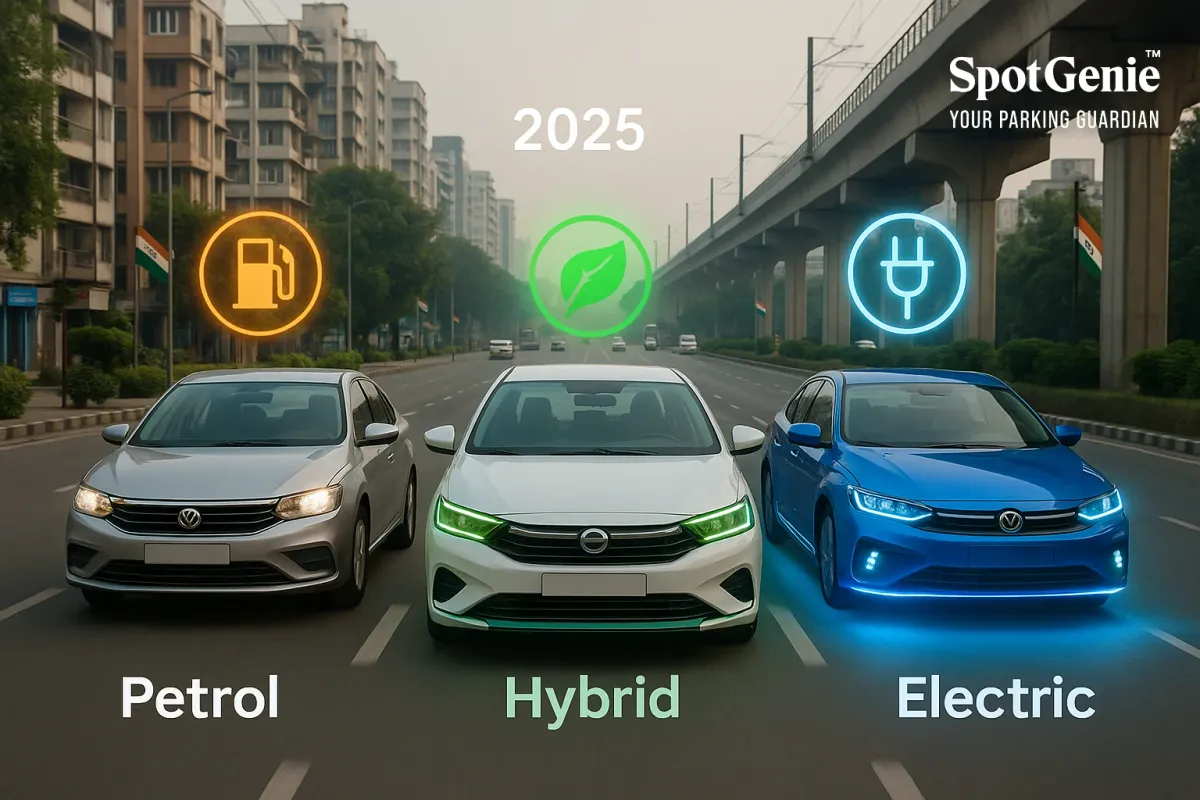SpotGenie Gyaan: Petrol vs Hybrid vs EV
Confused between petrol, hybrid, or EV in 2025? Here’s a full comparison of price, mileage, running costs, charging, and eco impact to help Indian buyers make the right choice.

The Indian car market in 2025 is buzzing with choices. Buyers now face a big question: stick with petrol, go hybrid, or jump into EVs?
Each has pros, cons, and suitability depending on your driving pattern, city infrastructure, and budget. Let’s break it down in simple, fact-checked terms.
1. Petrol Cars in 2025
Still the most common choice in India, petrol cars dominate sales, though their share is declining as hybrids and EVs gain traction.
Pros
- Lower upfront cost compared to hybrids and EVs
- Widely available fuel stations across India
- Variety of models, from hatchbacks to SUVs
- Smoother performance vs diesels
Cons
- Expensive running costs (petrol ~₹105-115/litre in metro cities, Sep 2025)
- Lower mileage (~12-18 km/l for most cars)
- Higher emissions → not eco-friendly
- Poor resale compared to hybrid/EV
Best For
Buyers with low yearly running (<8,000 km) or those living in areas without EV infra.
2. Hybrid Cars in 2025
Hybrids are the middle ground between petrol and EV. India now has multiple models: Toyota Hyryder, Maruti Grand Vitara, Honda City e:HEV, and newcomers from Hyundai & MG.
Pros
- Mileage ~22-28 km/l (real-world 21-25 km/l for strong hybrids)
- No charging infra needed (self-charging batteries)
- Lower emissions than petrol-only cars
- Smoother urban driving with EV mode in traffic
Cons
- Expensive upfront (₹16-21 lakh range for SUVs, ₹20.5 lakh for Honda City e:HEV)
- Limited boot space due to batteries
- Not as “green” as EVs
- Still dependent on petrol
Best For
City drivers clocking 12,000-20,000 km/year who want to save fuel costs but don’t want EV charging hassles.
3. EVs in 2025
EV adoption in India is accelerating, thanks to models like Tata Nexon EV, Mahindra XUV400, MG ZS EV, Hyundai Ioniq 5, BYD Seal, and premium offerings from Mercedes and BMW.
Pros
- Lowest running cost: ~₹1.2-2/km (vs ₹6-8/km for petrol)
- Zero tailpipe emissions → eco-friendly
- Instant torque & smooth drive
- Government subsidies, lower road tax in some states
Cons
- Higher upfront cost (Nexon EV ₹14-20 lakh, MG ZS EV ₹22-28 lakh, Hyundai Ioniq 5 ₹45+ lakh)
- Limited charging infra outside metro cities (though expanding fast with ~15,000+ public chargers as of Sep 2025, source: Ministry of Power)
- Longer recharge time vs 5-min petrol refill
- Battery replacement costs (₹4-6 lakh after 7-8 years, though warranties cover most)
Best For
Urban buyers with access to home charging, who want eco-friendly daily commutes and drive 12,000+ km/year.
4. Cost Comparison: Petrol vs Hybrid vs EV (2025)
| Aspect | Petrol Car | Hybrid Car | Electric Car |
|---|---|---|---|
| Price Range | ₹6-15 lakh | ₹16-21 lakh | ₹9-50 lakh (varies) |
| Mileage / Range | 12-18 km/l | 22-28 km/l | 250-600 km per charge |
| Fuel/Energy Cost | ₹6-8/km | ₹3-4/km | ₹1.2-2/km |
| Infra Needs | Fuel pumps everywhere | No charging needed | Requires chargers |
| Eco Impact | High CO₂ emissions | 30-40% lower emissions | Zero tailpipe emissions |
| Best For | Low-use buyers | City drivers, fuel savers | Eco-conscious urbanites |
Which Should You Buy in 2025?
- Choose Petrol if budget is tight, usage is low, and you live in rural areas.
- Choose Hybrid if you want fuel savings without range anxiety, great for city drives.
- Choose EV if you have charging access, higher usage, and want the greenest option.
In short:
- Short-term budget → Petrol
- Balanced choice → Hybrid
- Future-proof & eco-conscious → EV
SpotGenie
No matter what you drive, petrol, hybrid, or EV, parking and communication remain a challenge in Indian cities.
That’s where SpotGenie makes life easier:
- Get instant WhatsApp alerts for towing risks or emergencies.
- Allow others to notify you without sharing your number.
- Works across petrol, hybrid, and EV vehicles alike.
Smarter driving + smarter parking = the way forward for India in 2025.
FAQs
Q1. Are hybrids better than EVs in India?
A1. For now, yes, if you don’t have charging access. But EVs are the greener long-term option.
Q2. What’s cheaper to run: hybrid or EV?
A2. EVs are cheapest (~₹1.5/km), but hybrids (~₹3-4/km) are far cheaper than petrol (~₹6-8/km).
Q3. Do hybrids need charging stations?
A3. No, they self-charge through regenerative braking.
Q4. Will EV charging infra improve by 2030?
A4. Yes, India targets 100,000+ chargers by 2030 (Govt MoP projection).
Q5. Which is best for resale in 2025?
A5. Hybrids hold strong resale value as demand is rising; EV resale depends on battery warranty.
Final Thoughts
The petrol vs hybrid vs EV debate in 2025 isn’t about “which is best overall,” but “which is best for you.”
- Petrol cars remain cheapest upfront.
- Hybrids save fuel without charging headaches.
- EVs are the greenest, cheapest to run long-term.
Whatever you choose, make sure your urban parking is stress-free with SpotGenie, India’s contactless vehicle alert system.
Follow us on:
🅾 Instagram |
ⓕ Facebook |
𝕏 X |
▶️ YouTube |
🟢 WhatsApp



